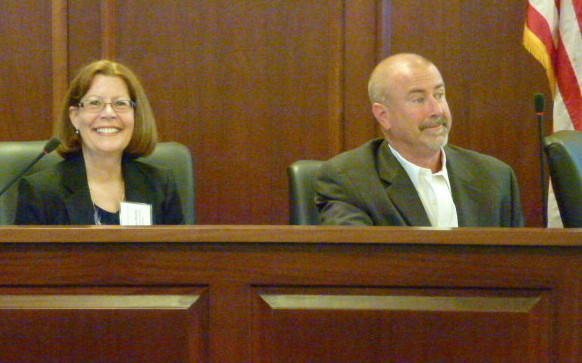Chairman Richard Westerberg’s last words to his task force members just before noon on Friday were, “See you in August!”
The governor’s Taskforce for Improving Education must now complete its summer assignment.
The 31 members are split into three working groups — focusing on effective teachers and leaders, fiscal stability and structural change — which have been instructed to land on 3 to 4 recommendations apiece.
Here’s the plan

Each group will meet on its own time schedule, in person or via conference call. Recommendations will be presented to the next meeting of the full task force on Aug. 23. A list of about 10 recommendations will be culled and handed to the State Board of Education for review before making its way to the governor’s desk by Sept. 23.
“That gives us six months to really focus on those things that make the biggest difference,” Westerberg said. “Our final recommendations will be the basis for the governor’s work going forward.”
Roger Brown, an aide to Gov. Butch Otter and a task force member, told the full group to “translate vision and brainstorming into actionable items.” He continued to say that recommendations can be a suggestion to collaborate or a call for legislative action.
Bob Lokken, the task force representative from Idaho Business for Education, started his group’s discussion by saying the task force should immediately take a position supporting Idaho Core Standards. Everyone appeared to agree. Westerberg set about asking other members and may soon release a statement of the task force’s support. (Click here to read more about what leaders and groups already support or oppose Idaho Core Standards.)
Morning conversation
Idaho Core Standards (known nationally as Common Core State Standards) was a main topic of discussion.
So was a review of testimony from seven task force meetings held statewide in April. So many of the comments were about implementing Idaho Core Standards that the task force decided it was necessary to review Idaho’s adoption history.
“We heard a lot on Common Core and some of it was not accurate,” said Rep. Reed DeMordaunt, R-Eagle. “What are we doing about getting accurate information to our local patrons?”
Most public comments focused on these topics:
- 57 on Common Core, with 42 opposed.
- 44 on funding concerns.
- 14 on charter schools.
- 14 on professional development.
- 13 on early childhood education.
- 13 on standardized testing.
- 9 on special needs education.
- 7 on pay for performance.
- 7 on individualized instruction.
- 6 on use of technology.
All of the comments are on the State Board of Education website, including email traffic.
Boise School Superintendent Don Coberly said his district endorses Idaho Core Standards because they are college-ready standards that allow local control and flexibility.
“We’ve known this was coming for 2 1/2 years and most districts are pretty much ready,” Coberly said.
Coberly and Linda Clark, Meridian schools superintendent and a task force member, talked about how they had shared training with other area districts.
There was clear task force support for Idaho Core Standards, but concerns about the state providing adequate professional development, materials and calendar days to get the job done right.
“About $20 million will be given to districts this school year to buy training time or materials,” said State Superintendent Tom Luna.
DeMourdant asked if other districts were sharing resources or training.
Coberly said the Idaho Leads Project is the “very best example” of districts working together to implement Core Standards. The Idaho Leads Project has about 50 districts and charters who have already agreed to participate in year-long professional development.
“While Idaho Leads is working with the willing, we will be working with the unwilling,” Luna said.
The State Department of Education gave a presentation on the Smarter Balanced Assessment Consortium, the tests that come with Core Standards.
Idaho is one of 26 states in the consortium, including Oregon, Washington and Montana.
“We have a real advantage because Idaho has been doing computer testing for 10 years,” said Luci Willits from the State Department of Education.
Task force members shared their concerns about the test, hoping class time will not be reduced for testing and that other tests can be abandoned.
Luna warned the group of a huge hurdle about to emerge from the more rigorous test. Scores will drop. Parents may find it disturbing that their child is no long proficient.
“It’s not as though children are any less smart, they are just being measured against a higher standard,” Luna said. “It’s going to get bumpy.”
Disclaimer: The Idaho Leads Project and Idaho Education News are funded by the J.A. and Kathryn Albertson Foundation. Idaho Education News is housed under the Idaho Leads Project at Boise State University.
